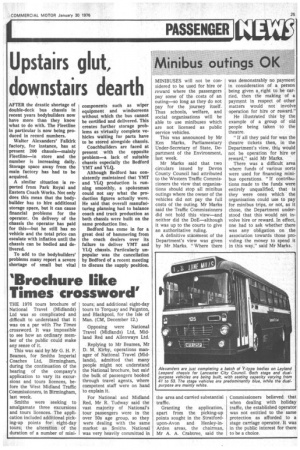Upstairs glut, downstairs dearth
Page 27

If you've noticed an error in this article please click here to report it so we can fix it.
AFTER the drastic shortage of double-deck bus chassis in recent years bodybuilders now have more than they know what to do with. The Fleetline in particular is now being produced in record numbers.
Walter Alexanders' Falkirk factory, for instance, has at present 200 chassis—mainly Fleetline—in store and the number is increasing daily. Storage space away from the main factory has had to be acquired.
A similar situation is reported from Park Royal and Eastern Coach Works. Not only does this mean that the bodybuilder has to hire additional storage space, but it can cause financial problems for the operator. On delivery of the chassis the operator has paid for this—but he still has no vehicle and the total price can escalate with inflation until the chassis can be bodied and delivered.
To add to the bodybuilders' problems many report a severe shortage of small but vital components such as wiper equipment and windscreens without which the bus cannot be certified and delivered. This creates further storage problems as virtually complete vehicles waiting for parts have to be stored alongside chassis.
Coachbuilders are faced at present with the opposite problem—a lack of suitable chassis especially the Bedford YMT and YLQ.
Although Bedford has consistently maintained that YMT and YLQ production is running smoothly, a spokesman could not say what the production figures actually were. He said that overall manufacturing planning had to balance coach and truck production as both chassis were built on the same production line.
Bedford has come in for a great deal of hammering from the coach dealers over its failure to deliver YMT and YLQ chassis. Particularly unpopular was the cancellation by Bedford of a recent meeting to discuss the supply position. MINIBUSES will not be considered to be used for hire or reward where the passengers pay some of the costs of an outing—so long as they do not pay for the journey itself. Thus schools, welfare, and social organisations will be able to use minibuses which are not licensed as public service vehicles.
This was announced by Mr Ken Marks, Parliamentary Under-Secretary of State, Department of the Environment, last week.
Mr Marks said that two circulars issued by Devon County Council had attributed to the Western Traffic Commissioners the view that organisations should stop all minibus outings where the owner of the vehicles did not pay the full costs of the outing. Mr Marks said the Traffic Commissioners did not hold this view—and neither did the DoE—although it was up to the courts to give an authoritative ruling.
A definitive statement of the Department's view was given by Mr ,Marks, ' Where there was demonstrably no payment in consideration of a person being given a, right to be carried, then the making of a payment in respect of other matters would not involve operation for hire or reward."
He illustrated this by the example of a group of old people being taken to the theatre.
"If all they paid for was the theatre tickets then, in the Department's view, this would not be operation for hire or reward," said Mr Marks.
There was a difficult area where funds of various sorts were used for financing minibus operations. "If contributions made to the funds were entirely unqualified, that is they were ones which the organisation could use to pay for minibus trips, or not, as it chose, the Department understood that this would not involve hire or reward. In effect, one had to ask whether there was any obligation on the association towards those providing the money to spend it in this way," said Mr Marks.
































































































